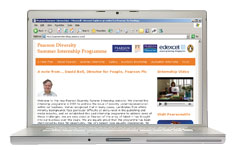Valuing our people
Building our community
We aim to attract, take on and promote the most talented people, irrespective of race, gender, age, physical ability, religion or belief, sexual orientation, marital/civil partnership status or any other criteria not specifically related to relevant aptitudes, potential, skills and abilities. Increasing our diversity isn't a cosmetic or a political exercise for us – we believe that as an international company, a workforce where differences are valued and respected is vital to our future, and we want minds and imaginations from as broad a base as possible right across the company. We know that maintaining excellent channels of communication is central to making all those voices heard, contributing in turn to the motivation, the pride and the sense of ownership people feel about their role at Pearson. It is also crucial for pulling the best potential Pearson people in and encouraging them to stay with us. We want to reflect the societies in which we operate: we don't set specific targets, but our continued goal is to have diversity at the heart of everything we do, and to be the best in our industry for diversity. We have dedicated Diversity Teams and Councils in both the US and the UK, a senior member of staff at each Pearson company who acts as a Diversity Champion, and a widely publicised set of initiatives communicated on internal intranets and through the Diversity website.
Activity summary
Over the past five years, the overall number of women in the US and UK workforce has remained consistently high, with females representing 60% and 56% of the total population at Pearson in the US and UK respectively. More than half of Pearson managers are female and women now comprise 32% and 20% of the US and UK senior management teams respectively.
In the UK, the segment of our workforce from a minority ethnic background has increased every year to over 14% in 2008, up from 9% five years ago. In the US, that segment has grown from 15.7% in 2005 to 19.9% in 2008, with a 2% increase in minority managers, to 12% of the team. UK managers of minority backgrounds represent 11% of the team.
In 2008, we launched our World Wide Save for Shares (WWSFS) plan in 63 countries, translating our staff website and plan documents into 15 different languages, including Lithuanian, Polish, Portuguese, traditional and simplified Chinese, Japanese, Malay and Filipino. Modelled on the UK Save As You Earn scheme, we have offered Save For Shares to our UK people since the 1980s and to our international staff since 1998.

Snapshots
The pan-Pearson communications programme now includes informal social networking tools like Yammer, Facebook, wiki groups, Twitter and FriendFeed to add to the various blogs, internal company-specific intranets, regular newsletters and large-scale annual presentations from senior managers to staff around the world.

Our UK Diversity team relaunched their summer internships website in 2008, now featuring the newly formed diversity partnership with The Economist (of which Pearson owns 50%).
Focus on: INTER-COMPANY INITIATIVES
We have mentoring programmes across the company, some more formal than others, but we've found that mentoring is a highly effective way to connect people in different parts of the business. As with the short-term assignments we enable through our NewDirections programme, both sides of the partnership are able to gain insight into sometimes previously undiscovered parts of the organisation, growing each other's skills and raising aspirations. Two examples of these are below:
Mentoring: A number of successful relationships were formed across the finance teams of different operating companies in 2008. One such example involved a mentee presented with the prospect of redundancy and the need for redeployment. The mentor worked with the mentee throughout this time, providing information on the Pearson businesses and types of roles the mentee could consider, plus a network of contacts in the Finance department. The mentor offered support throughout the job search process and the mentee was successful in moving across the company to another suitable role.
New Directions: A designer from Pearson Curriculum Chicago spent two weeks with Maskew Miller Longman in South Africa in March 2008. The purpose of the visit was to share best practice for product development and work with the design team in South Africa. This experience helped him to develop an operational network and understand the challenges and opportunities faced by MML in the South African market. A reciprocal visit is being considered for the future.
FAST FACTS
We’ve identified at least one ‘ready-now’ and one ‘ready soon’ successor for each of the top roles across Pearson: although we may sometimes choose to look externally to get fresh eyes on an old problem or bring in specific skills, we know we always have people to step into the key Pearson roles if required.
A few words from… Paulo Pisano
"When I joined Pearson in October 2008, I soon noticed some remarkable features about the culture.
One was that a lot of people seem to be studying for something or learning a new skill – perhaps a welcome side effect of being surrounded by information. Another was that there is a healthy level of competition and cooperation between different parts of the business, which seems to drive our designers and sales people to really take note of what’s happening in their part of the world and be the best in their field.
But I think the most striking distinction was that people here are genuinely aware of the power they have in their jobs to make the world a better place. I think that there's a real culture of valuing the contribution of each person at Pearson, and it has an effect on how our people view their own capacity to influence positive change. They know they are capable, innovative and valued people because we work hard to treat them as such, and that's why they are able to produce such fantastic results for Pearson."

Paulo Pisano Director, Human Resources,
Pearson Education International
- Further information
- Legal statement/Disclaimer
- Forward looking statements
- Accessibility
- Site map
- © 2009 Pearson plc
